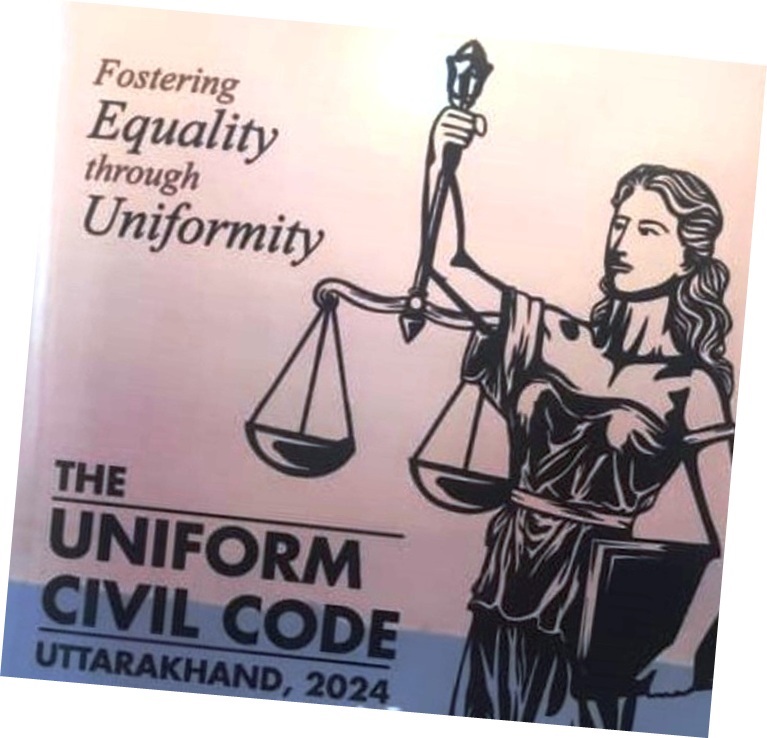The Government of Uttarakhand has received a draft of the Uniform Civil Code (UCC) from a government-appointed panel— intended to provide a comprehensive legal framework for uniform marriage, divorce, land, property, and inheritance laws that apply to all citizens, regardless of their religion.
The draft report was submitted to Chief Minister Pushkar Singh Dhami on February 4, 2022, by a five-member panel headed by retired Supreme Court Judge, Ranjana Prakash Desai. CM Dhami says, this development marks a critical step towards achieving uniformity and equality in the legal system, while ensuring that the fundamental rights of individuals are safeguarded.
Modi Government’s UCC Push Ahead of Lok Sabha Polls
The draft report is a response to the endorsement by Indian Prime Minister, Narendra Modi of a Uniform Civil Code in June 2021. The report’s title, ‘Fostering Equality Through Uniformity’, encapsulates the essence of the report’s aim.
The report is symbolic in that it portrays Lady Justice without a blindfold, which is typically used to signify that the law is impartial and objective. Sources indicate that the removal of the blindfold takes this symbolism a step further by representing the ideal of treating everyone equally under the law.
A Special Session in Uttarakhand Assembly to Legilate UCC
The Legislative Assembly of Uttarakhand has scheduled a special session from February 5th to February 8th to deliberate on the implementation of legislation pertaining to the Uniform Civil Code.
If the proposed UCC bill is passed and subsequently implemented, it would make Uttarakhand the first state in the country to adopt the Uniform Civil Code after India gained independence. Other states, such as Madhya Pradesh and Assam, which are governed by the Bharatiya Janata Party, have also expressed interest in enacting similar legislation. It is noteworthy that Goa has had a Common Civil Code since its time as a Portuguese colony.
Expert Panel Makes Recommendations
The expert panel assembled to draft the Uniform Civil Code in Uttarakhand has submitted its final report to Chief Minister Pushkar Singh Dhami. The report recommends prioritizing gender equality, prohibiting practices such as polygamy, and criminalizing halala, iddat, and triple talaq. Furthermore, the report recommends setting a uniform legal age for marriage for both men and women regardless of religion. The proposed legislation, however, excludes tribal communities.
The report proposes the establishment of uniform adoption rights and mandatory registration for live-in relationships. While the committee received recommendations to address population control measures, the matter will be examined by an expert committee formed by the Central government.
In order to address challenges arising from rapid population growth and demographic changes, Finance Minister Nirmala Sitharaman announced the formation of a high-powered committee. In his annual Vijayadashami speech, RSS Sarsanghchalak Mohan Bhagwat called for the development of a comprehensive policy for population control that would be applicable to all individuals equally.
The Uniform Civil Code: A Game Changer?
The Uniform Civil Code, if implemented, could bring about significant changes in the legal framework of the country. It aims to create a uniform set of laws governing personal matters, such as marriage and divorce, for all citizens, irrespective of their religion. The exemption of tribal communities shows that the government is either taking into account the concerns of different communities or fears dissent.
UCC has been a topic of contention, with a substantial number of individuals opposing it as they believe that it may infringe upon religious rights and lead to cultural homogenization. Even the topic of population control and demographic changes requires a comprehensive approach that incorporates the views of diverse communities.
In general terms, the Uniform Civil Code has the potential to introduce substantial transformations to the country’s legal system and bring in a consistent legal framework for personal matters. Nonetheless, its implementation should be undertaken with sensitivity towards all stakeholders involved.

